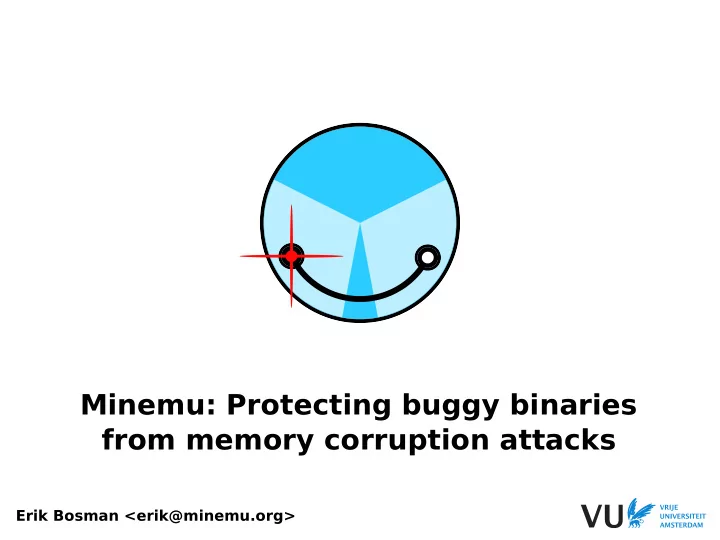

Taint tracking (1/2): - remember whether data is trusted or not - untrusted data is 'tainted' - when data is copied, its taint is copied along - taint is ORed for arithmetic operations
Taint tracking (2/2): When the code jumps to an address in memory, the source of this address is checked for taint. eg.: - RET - CALL *%eax - JMP *0x1c(%ebx)
T aint tracking photo: sammydavisdog@ fl ickr useful, but slow as hell
Is this slowness fundamental? minemu fast emulator memory layout use SSE registers to hold taint
Is this slowness fundamental? minemu fast emulator memory layout use SSE registers to hold taint
Emulator compile jit code
Emulator run jit code compile jit code
Emulator indirect jump run jit code find jump compile jit code address
Emulator indirect jump lookup miss run jit code find jump compile jit code address
Dynamic instrumentation t_eax = t_eax | t_ecx eax = eax + ecx eax = eax + ebx original code jit code
Is this slowness fundamental? minemu fast emulator memory layout use SSE registers to hold taint
Linux stack User heap/libs executable
Memory layout (linux) linux kernel USER
Memory layout (minemu) linux USER kernel minemu TAINT
Memory layout (minemu) linux USER kernel minemu TAINT
Memory layout (minemu) linux write to x USER kernel minemu TAINT
Memory layout (minemu) linux write to x USER kernel minemu TAINT x+const
Memory layout (minemu) taint data to linux user USER memory kernel minemu user TAINT data to taint memory
Memory layout (minemu) taint data to linux user USER memory kernel minemu user TAINT data to taint memory
Addressing shadow memory mov EAX, (EDX)
Addressing shadow memory mov EAX, (EDX) address: EDX
Addressing shadow memory mov EAX, (EDX) address: EDX taint: EDX+ const
Addressing shadow memory mov EAX, (EDX+EBX*4)
Addressing shadow memory mov EAX, (EDX+EBX*4) address: EDX+EBX*4
Addressing shadow memory mov EAX, (EDX+EBX*4) address: EDX+EBX*4 taint: EDX+EBX*4+ const
Addressing shadow memory push ESI
Addressing shadow memory push ESI address: ESP
Addressing shadow memory push ESI address: ESP taint: ESP+ const
Is this slowness fundamental? minemu fast emulator memory layout use SSE registers to hold taint
T aint propagation in SSE registers xmm5 scratch register scratch register xmm6 T(eax) T(eax) T(ecx) T(ecx) T(edx) T(edx) T(ebx) T(ebx) xmm7 T(esp) T(esp) T(ebp) T(ebp) T(esi) T(esi) T(edi) T(edi) 128-bit
T aint propagation in SSE registers add EDX, x xmm5 scratch register scratch register xmm6 T(eax) T(eax) T(ecx) T(ecx) T(edx) T(edx) T(ebx) T(ebx) xmm7 T(esp) T(esp) T(ebp) T(ebp) T(esi) T(esi) T(edi) T(edi) 128-bit
T aint propagation in SSE registers add EDX, x xmm5 scratch register scratch register xmm6 T(eax) T(eax) T(ecx) T(ecx) T(edx) T(edx) T(ebx) T(ebx) xmm7 T(esp) T(esp) T(ebp) T(ebp) T(esi) T(esi) T(edi) T(edi)
T aint propagation in SSE registers add EDX, x xmm5 T(x) T(x) xmm6 T(eax) T(eax) T(ecx) T(ecx) T(edx) T(edx) T(ebx) T(ebx) xmm7 T(esp) T(esp) T(ebp) T(ebp) T(esi) T(esi) T(edi) T(edi) vector insert
T aint propagation in SSE registers add EDX, x xmm5 T(x) T(x) xmm6 T(eax) T(eax) T(ecx) T(ecx) T(edx) T(edx) T(ebx) T(ebx) xmm7 T(esp) T(esp) T(ebp) T(ebp) T(esi) T(esi) T(edi) T(edi) or
E ff ectiveness Application Type of vulnerability Security advisory Snort 2.4.0 Stack over fl ow CVE-2005-3252 Cyrus imapd 2.3.2 Stack over fl ow CVE-2006-2502 Samba 3.0.22 Heap over fl ow CVE-2007-2446 Memcached 1.1.12 Heap over fl ow CVE-2009-2415 Nginx 0.6.32 Buffer underrun CVE-2009-2629 Proftpd 1.3.3a Stack over fl ow CVE-2010-4221 Samba 3.2.5 Heap over fl ow CVE-2010-2063 Telnetd 1.6 Heap over fl ow CVE-2011-4862 Ncompress 4.2.4 Stack over fl ow CVE-2001-1413 Iwcon fi g V.26 Stack over fl ow CVE-2003-0947 Aspell 0.50.5 Stack over fl ow CVE-2004-0548 Htget 0.93 Stack over fl ow CVE-2004-0852 Socat 1.4 Format string CVE-2004-1484 Aeon 0.2a Stack over fl ow CVE-2005-1019 Exim 4.41 Stack over fl ow EDB-ID#796 Htget 0.93 Stack over fl ow Tipxd 1.1.1 Format string OSVDB-ID#12346
Performance HTTP HTTPS
Performance SPECINT 2006 2.4x overall 5 4 3 2 1 0 400.perlbench 401.bzip2 403.gcc 429.mcf 445.gobmk 456.hmmer 458.sjeng 462.libquantum 464.h264ref 471.omnetpp 473.astar 483.xalancbmk overall 3 2 1 0 gzip OpenSSH PostgreSQL MediaWiki (scp+sshd) (pgbench) (HTTPS)
Limitations
Limitations Doesn't prevent memory corruption, only acts when the untrusted data is used for arbitrary code execution.
Limitations Tainted pointer dereferences ->some_field = useful_untainted_value; tainted_pointer
Limitations Tainted pointer dereferences ->some_field = useful_untainted_value; tainted_pointer propagation can lead to false positives: dispatch_table[ ](); checked_input
Limitations Taint whitewashing out = latin1_to_ascii[ ]; in
Limitations Format string attacks: printf( ); "%65534s %123$hn" // Propagates taint in glibc printf( ); // Does not :-( "FillerFiller...%123$hn"
Limitations Does not protect against non-control-flow exploits
Limitations Does not protect against non-control-flow exploits void char char try_system( *username, *cmd) { user_rights = get_credentials(username); int 16 char buf[16] ; strcpy(buf, username); (user_rights & ) ALLOW_SYSTEM if system(cmd); else log_error( , buf); "user attempted login" %s }
Limitations Does not protect against non-control-flow exploits void char char try_system( *username, *cmd) { user_rights = get_credentials(username); int 16 char buf[16] ; strcpy(buf, username); (user_rights & ) ALLOW_SYSTEM if system(cmd); else log_error( , buf); "user attempted login" %s }
Limitations Does not protect against non-control-flow exploits void char char try_system( *username, *cmd) { user_rights = get_credentials(username); int 16 char buf[16] ; strcpy(buf, username); (user_rights & ) ALLOW_SYSTEM if system(cmd); else log_error( , buf); "user attempted login" %s }
Recommend
More recommend